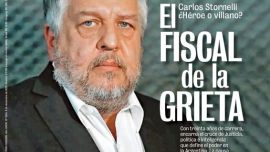President Mauricio Macri this week halted efforts to slap curbs on the prices of electricity, gas and water, vetoing a measure approved by lawmakers and citing a need for fiscal discipline.
The opposition-sponsored law, approved early Thursday morning by the Senate in a 37-30 vote that followed heated debate, would have rolled back prices for public utilities to November levels, and linked future hikes to salary increases.
Opposition lawmakers contend that the law was vital to help citizens who have been losing purchasing power as inflation continues to rise. Many of the votes for the measure came from lawmakers aligned with former president Cristina Fernández de Kirchner, now a senator for Buenos Aires Province, although Macri has faced internal dissent over the issue inside the ruling Cambiemos (Let’s Change) coalition.
The government went into action immediately as it moved to strike down the law. Cabinet Chief Marcos Peña called the law “irresponsible” and said that it was vetoed because it doesn’t respect the Constitution, since lawmakers cannot set utility rates.
The government has pushed for a removal of subsidies to prices almost a decade after they were frozen. During her 2007- 2015 administration, Fernández de Kirchner kept energy exceptionally cheap through large subsidies even at times of spiralling consumer prices.
At a press conference Thursday, Macri said that the law effectively would have blocked payments for infrastructure and other projects.
“It would mean suspending ... disability payments, pensions for retirees, or suspending works nationwide that provide drinking water, sewage ... improvements on the airport so we can get more tourists, or energy,” Macri said. “I’m the first one who doesn’t want to hike [utilities]. I wouldn’t if we didn’t need to. ... I’d like to wave a magic wand and make money appear.”
TENSION
Political and social tension has risen over the last few weeks after the strong and sudden 20-percent devaluation of the peso against the dollar and the government’s announcement that it would seek a line of credit with the International Monetary Fund (IMF) as it seeks to reign in the budget deficit.
The decision unsettled some citizens, many of whom link the IMF to painful memories of past economic and social crisis, which culminated in 2001 with a sovereign debt default.
With Macri making the unpopular decision to seek a loan, his government is seeking to show progress toward lowering the fiscal deficit from 3.9 percent of GDP in 2017 to its target of 2.7 percent this year and 2.2 percent in 2019.
The veto was the fifth issued since he became president in December, 2015. It remains to be seen how large a political cost he will pay for the move, which will likely be applauded by markets and IMF officials. Nonetheless, it is clear that the opposition seized upon an opportunity to set the agenda and force the president into an unpopular move.
“We want them to review the tariff policy, which consists cynically of asking Argentines to carry their country on their shoulders, instead of asking government officials to bring back the money they have tucked away abroad,” said Peronist Senator Anabel Fernández Sagasti, referring to offshore accounts held by government ministers.
“The opposition bloc knows that it cannot be implemented and recognizes that it doesn’t matter, because it says it wants to send a message to the Executive,” Cambiemos’ Senator for Buenos Aires Province Esteban Bullrich responded.
The president was clear from the off that the bill would be vetoed. He even went on national television late Wednesday night to urge opposition senators not to approve it, arguing the price cuts would cost US$3.9 billion.
Analysts said that Macri decided to absorb the political cost of vetoing the bill because he needs to show investors that he will carry on with measures aimed at strengthening Argentina’s economy.
“He’ll be seen as defending unpopular measures at a time where economic conditions have worsened,” said Daniel Kerner of analysts Eurasia. “His popularity has declined quite a bit, and this trend will likely continue in the coming months as inflation remains high and the next few months will see more of this.”
‘NOTHING HAS CHANGED’
On Thursday, Macri travelled to Salta province where he met with Governor Juan Manuel Urtubey. Questioned about the veto, the president responded: “Nothing has changed, they [the opposition] are back to where they started.”
The law “has been vetoed. It has no financing, those who voted in favour of it did not say where they would find the resources [to finance the law],” he charged. “It’s not the responsibility of Congress to establish utility prices.”
The head of state took aim at the Justicialist Party (JP), traditionally the country’s most powerful political party, saying they “must explain why they voted for a law that even they said was a disaster.”
Following the break-down of a legislative alliance with dissident Peronist Sergio Massa and his Renewal Front movement last year, Macri has been focussing his attention on shoring up his bonds with the country’s governors. Many wield great influence over lawmakers representing their respective provinces in the national Congress.
Macri’s relationship with Urtubey is a curious one since the Salta leader has long expressed his intentions to run for president in 2019. Urtubey, a former ally of Fernández de Kirchner, jumped ship almost immediately after Macri’s 2015 electoral triumph over Kirchnerite candidate Daniel Scioli.
The governor said Thursday that he would “continue working to ensure the president was successful,” while insisting that in 2019 he would propose a “better alternative.”
“We’re Peronists and we are going to propose a better alternative. I am among those who believe we should try to compete, not so that our opponent fails but because we can offer something better,” he said during a join press conference with Macri. “The government is pushing a policy of austerity which I do not share.”


























Comments